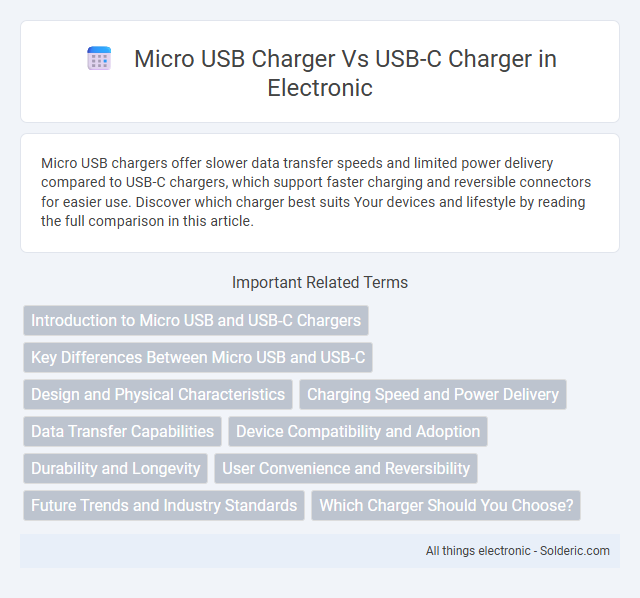Micro USB chargers offer slower data transfer speeds and limited power delivery compared to USB-C chargers, which support faster charging and reversible connectors for easier use. Discover which charger best suits Your devices and lifestyle by reading the full comparison in this article.
Comparison Table
| Feature | Micro USB Charger | USB-C Charger |
|---|---|---|
| Connector Shape | Flat, trapezoidal | Oval, reversible |
| Reversibility | No | Yes |
| Power Delivery | Up to 15W | Up to 100W |
| Data Transfer Speed | Up to 480 Mbps (USB 2.0) | Up to 10 Gbps (USB 3.1 Gen 2) |
| Compatibility | Older devices | Wide range: smartphones, laptops, tablets |
| Durability | Less durable | More durable, robust design |
| Future-Proof | No | Yes |
Introduction to Micro USB and USB-C Chargers
Micro USB chargers, widely used in older smartphones and devices, deliver slower data transfer speeds and lower power output compared to USB-C chargers. USB-C chargers support faster charging, higher data bandwidth, and reversible connectors, enhancing usability and efficiency. Your choice between Micro USB and USB-C significantly impacts device compatibility and charging performance.
Key Differences Between Micro USB and USB-C
Micro USB chargers feature a smaller, flatter design with a maximum data transfer rate of 480 Mbps and typically support up to 15W charging power. USB-C chargers provide reversible connectors, faster data transfer speeds up to 10 Gbps with USB 3.1, and higher power delivery of up to 100W, enabling rapid device charging. The USB-C standard supports video output and more versatile device compatibility compared to the legacy Micro USB interface.
Design and Physical Characteristics
Micro USB chargers feature a smaller, asymmetrical connector with a trapezoidal shape that only fits in one orientation, while USB-C chargers have a larger, symmetrical oval design allowing reversible plugging. USB-C connectors support faster data transfer and power delivery due to more pins inside the port, enabling charging speeds up to 100W compared to micro USB's limited capacity. Your device benefits from the USB-C's sturdier build and universal compatibility with the latest smartphones, tablets, and laptops.
Charging Speed and Power Delivery
USB-C chargers offer significantly faster charging speeds and higher power delivery compared to micro USB chargers, supporting up to 100W power transfer whereas micro USB typically maxes out around 15W. This enhanced power capability enables USB-C to charge larger devices like laptops and tablets efficiently, while micro USB is mostly limited to smaller gadgets like older smartphones. If you want quicker charging and compatibility with a wide range of modern devices, USB-C is the superior choice.
Data Transfer Capabilities
USB-C chargers support faster data transfer speeds up to 10 Gbps with USB 3.1 and beyond, compared to micro USB chargers that typically max out at 480 Mbps with USB 2.0. USB-C's reversible connector design allows for more reliable data connections and improved user convenience. Devices with USB-C ports enable seamless high-speed syncing and charging, making them ideal for modern smartphones, tablets, and laptops.
Device Compatibility and Adoption
Micro USB chargers are compatible with many older smartphones, tablets, and peripherals, making them widely adopted in devices released before 2017. USB-C chargers support a broader range of modern devices, including laptops, smartphones, and gaming consoles, due to their reversible connector and faster data transfer capabilities. Your choice depends on device compatibility and future-proofing needs, as USB-C continues to become the industry standard.
Durability and Longevity
USB-C chargers offer superior durability and longevity compared to micro USB chargers due to their reinforced connectors and reversible design, which reduce wear and tear from frequent plugging and unplugging. The robust construction of USB-C cables supports higher power delivery and faster data transfer, minimizing degradation over time. You will benefit from USB-C's increased lifespan, ensuring reliable performance and fewer replacements over extended use.
User Convenience and Reversibility
USB-C chargers provide greater user convenience with their reversible design, allowing users to plug in the cable without worrying about orientation, unlike micro USB chargers which require proper alignment and can cause damage if forced incorrectly. The reversible USB-C connector supports faster and more reliable connections, reducing wear and tear from repeated insertion attempts. This design enhances overall user experience by streamlining charging and data transfer processes, making USB-C the preferred choice for modern devices.
Future Trends and Industry Standards
USB-C chargers are rapidly becoming the global industry standard due to their faster data transfer speeds, higher power delivery capabilities, and reversible connector design, which enhances user convenience. Major technology companies and regulatory bodies worldwide are endorsing USB-C to reduce electronic waste and ensure universal compatibility across devices by 2024 and beyond. Micro USB is expected to phase out gradually as USB-C adoption grows, driven by advancements in smart device technology and increased demand for efficient, multi-functional charging solutions.
Which Charger Should You Choose?
USB-C chargers offer faster data transfer speeds and higher power delivery compared to micro USB chargers, making them ideal for modern smartphones, tablets, and laptops. Micro USB chargers remain compatible with many older devices but lack the efficiency and versatility of USB-C technology. Choosing a USB-C charger ensures future-proofing and better performance for a wider range of devices.
micro USB charger vs USB-C charger Infographic

 solderic.com
solderic.com